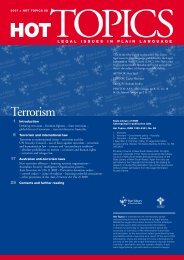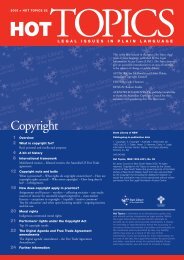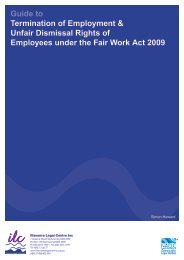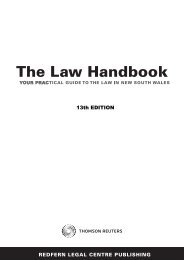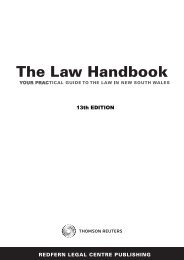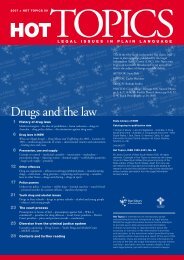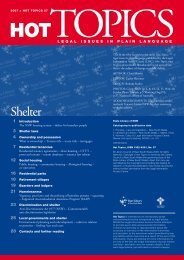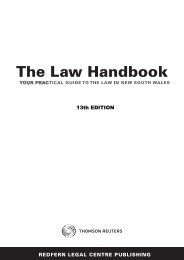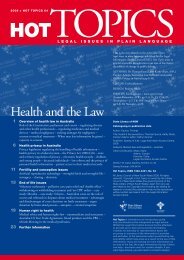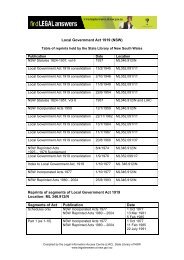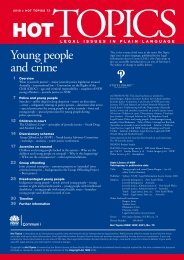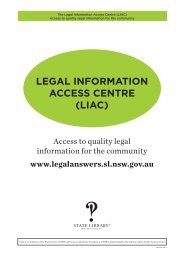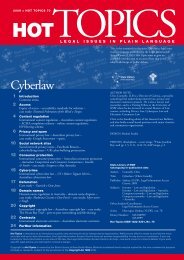Hot Topics - Issue 65: Human Rights - Legal Information Access ...
Hot Topics - Issue 65: Human Rights - Legal Information Access ...
Hot Topics - Issue 65: Human Rights - Legal Information Access ...
You also want an ePaper? Increase the reach of your titles
YUMPU automatically turns print PDFs into web optimized ePapers that Google loves.
Current<br />
human rights issues <br />
in Australia<br />
cOunTer-TerrOrisM and<br />
HuMan riGHTs<br />
On 11 September 2001, two passenger jets plunged into<br />
the twin-towers of the World Trade Centre in New York<br />
City, and another jet crashed to the ground in a field in<br />
Pennsylvania, apparently without reaching its intended<br />
target, and a fourth plane crashed into the Pentagon, in<br />
Washington DC. Close to 3000 people are believed to<br />
have been killed that day. This event, perhaps more than<br />
any other in recent memory, has served to re-focus the<br />
attention of governments around the world on the threat<br />
of terrorism.<br />
In Australia, the immediate effects of 9/11 were a steady<br />
stream of legislation from 2002-2006 that:<br />
> created a new (and controversially indefinitely defined)<br />
offence of ‘terrorism’;<br />
> allowed the Commonwealth Attorney-General<br />
to proscribe or ban organisations as ‘terrorist<br />
organisations’, the members and material supporters<br />
of which would be committing criminal offences;<br />
> introduced new criminal offences providing and<br />
receiving trainingconnected to terrorist acts; possessing<br />
‘things’ connected with terrorist acts; collecting or<br />
making documents likely to facilitate terrorist acts;<br />
and to do any act in preparation for or planning of<br />
terrorist acts. The criminal penalties range from 10<br />
years to life imprisonment;<br />
> allows people (including juveniles) suspected to have<br />
material information about a terrorist offence to be<br />
detained by warrant by the Australian Security &<br />
Intelligence Organisation (ASIO), without a court<br />
order, for compulsory and secret questioning. An<br />
individual can be questioned for up to 24 hours (48<br />
hours if an interpreter is required) and detained for<br />
questioning for up to 7 days. Refusal to participate<br />
or a breach of the secrecy provisions could result in<br />
imprisonment of up to 5 years. There is no right to<br />
silence;<br />
> removes the presumption in favour of bail for people<br />
accused of terrorist-related offences, modifying the<br />
long-held common law assumption to preserve an<br />
individual’s liberty until proven guilty;<br />
> allows a senior Australian Federal Police officer to<br />
issue a preventative detention order that allows a<br />
person to be put into detention for between 2-14 days<br />
where the officer has reasonable grounds to suspect<br />
that the person will engage in a terrorist act, or<br />
possesses a thing that is in connection to preparation<br />
of a terrorist act, or has done something in preparation<br />
for or planning of a terrorist attack, and making the<br />
order will substantially assist an ‘imminent’ terrorist<br />
attack that is expected to take place in the next 14<br />
days. No court hearing is required to make the order,<br />
but a person can challenge the order in court;<br />
> allows the AFP to apply to a court for a control order<br />
if the court accepts the making of the order will<br />
substantially assist in preventing a terrorist act, or<br />
the person has trained with a terrorist organisation.<br />
A control order can require a person to wear an<br />
electronic tracking device, to remain at certain<br />
premises at particular times, prevent a person from<br />
going to a particular place, prevent the person from<br />
communicating with particular people and prevent<br />
the person from accessing certain forms of technology,<br />
for instance, email or a mobile phone. Control orders<br />
can last 12 months (3 months for people aged 16-18<br />
years) and may be renewed;<br />
> allow the Commonwealth Attorney-General (rather<br />
than the presiding judge) to order both criminal and<br />
civil court hearings to be closed to the public and the<br />
media, and to control the disclosure of information<br />
deemed to be ‘national security information’ such<br />
that an accused person and their lawyer may not be<br />
entitled to see the evidence put against the accused<br />
person.<br />
Together, these reforms modify the principle of<br />
presumption of innocence of an accused person until<br />
proven guilty, the doctrine of separation of powers by<br />
which the judiciary exercises judicial power without<br />
interference from the Executive branch of government,<br />
and the principle of the transparent administration of<br />
justice such that justice is done, and seen to be done.<br />
From the perspective of human rights principles, states<br />
are permitted to ‘derogate’ or suspend their compliance<br />
with certain human rights standards in times of ‘public<br />
current human rights issues in australia 27



